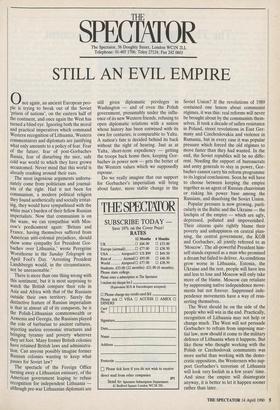SPECt E NTOR
The Spectator, 56 Doughty Street, London WC1N 2LL Telephone: 01-405 1706; Telex 27124; Fax 242 0603
STILL AN EVIL EMPIRE
0 nce again, an ancient European peo- ple is trying to break out of the Soviet `prison of nations', on the eastern half of the continent, and once again the West has turned a blind eye. Ignoring both the moral and practical imperatives which command Western recognition of Lithuania, Western commentators and diplomats are justifying what only amounts to a policy of fear. Fear of the future, fear of post-Gorbachev Russia, fear of disturbing the nice, safe cold war world to which they have grown accustomed. Never mind that this world is already crashing around their ears.
The most ingenious arguments unfortu- nately come from politicians and journal- ists of the right. Had it not been for communism, a modern political religion they found aesthetically and socially irritat- ing, they would have sympathised with the white man's burden of their fellow Russian imperialists. Now that communism is on the wane, we can sympathise with Mos- cow's predicament again: 'Britain and France, having themselves suffered from American anti-colonial prejudices, should show some sympathy for President Gor- bachev over Lithuania,' wrote Peregrine Worsthorne in the Sunday Telegraph on April Fool's Day. 'Arresting President Landsbergis would, in the circumstances, not be unreasonable.'
There is more than one thing wrong with this sentiment, but it is most surprising to watch the British compare their role in Asia and Africa with that of the Russians outside their own territory. Surely the distinctive feature of Russian imperialism is that in almost all of its conquests, be it the Polish-Lithuanian commonwealth or Armenia and Georgia, the Russians played the role of barbarian to ancient cultures, injecting useless economic structures and bringing tyranny and poverty wherever they set foot. Many former British colonies have retained British laws and administra- tion. Can anyone possibly imagine former Russian colonies wanting to keep what passes for Soviet law?
The spectacle of the Foreign Office turning away a Lithuanian emissary, of the American government leaping to refuse recognition for independent Lithuania although pre-war Lithuanian diplomats are still given diplomatic privileges in Washington — and of even the Polish government, presumably under the influ- ence of its new Western friends, refusing to open diplomatic relations with a nation whose history has been entwined with its own for centuries, is comparable to Yalta. A nation's fate is decided behind its back without the right of hearing. Just as at Yalta, short-term expediency — getting the troops back home then, keeping Gor- bachev in power now — gets the better of the Western values which we supposedly espouse.
Do we really imagine that our support for Gorbachev's imperialism will bring about faster, more stable change in the Soviet Union? If the revolutions of 1989 contained one lesson about communist regimes, it was this: real reforms will never be brought about by the communists them- selves. It took a decade of sullen resistance in Poland, street revolutions in East Ger- many and Czechoslovakia and violence in Rumania, but in every case it was popular pressure which forced the old regimes to move faster than they had wanted. In the end, the Soviet republics will be no diffe- rent. Needing the support of bureaucrats and army generals to stay in power, Gor- bachev cannot carry his reform programme to its logical conclusions. Soon he will have to choose between keeping the empire together as an agent of Russian chauvinism or risking his power base among the Russians, and dissolving the Soviet Union.
Popular pressure is now growing, parti- cularly in the Baltic and the Ukraine — the linchpin of the empire — which are ugly, depressed, polluted and impoverished. Their citizens quite rightly blame their poverty and unhappiness on central plan- ning, the central government, the KGB and Gorbachev, all jointly referred to as `Moscow'. The all-powerful President him- self stands exposed as a man who promised a dream but failed to deliver. As conditions grow worse in Lithuania, Estonia, the Ukraine and the rest, people will have less and less to lose and Moscow will only take more of the blame. Moscow can retaliate by suppressing native independence move- ments but not forever. Suppressed inde- pendence movements have a way of reas- serting themselves.
The West should be on the side of the people who will win in the end. Practically, recognition of Lithuania may not help or change much. The West will not persuade Gorbachev to refrain from imposing mar- tial law, now should it come to the military defence of Lithuania when it happens. But like those who thought working with the Polish or Czechoslovak communists was more useful than working with the demo- cratic opposition, the Westerners who sup- port Gorbachev's terrorism of Lithuania will look very foolish in a few years' time. And since the empire will disintegrate anyway, it is better to let it happen sooner rather than later.


















































 Previous page
Previous page